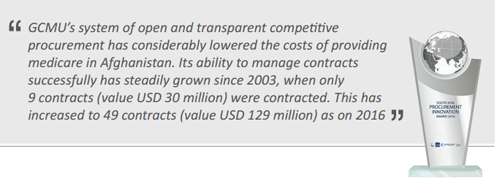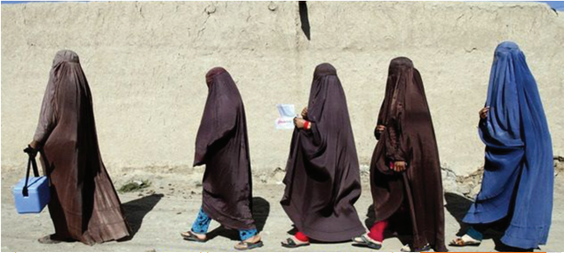Feature Stories
- How Bangladesh bridged the gap between amateur and professional in government procurement
- Rated Criteria: Promoting Value in World Bank Procurement
- Public Procurement Transformation in Bangladesh
- Achievement of Value for Money and Enhancement of Efficiency, Economy and Transparency in Procurement - Document Archive System
Archives
- End-to-End Procurement Planning and Maintenance System Integrated with Project MIS
- Application of Construction Milestones in Rural Road Contracts of Nepal
- Gross National Happiness Model for Pursuing Sustainable Public Procurement
- Government procurement is the basis of wide opportunities for enterprise development
- The Challenges of Procurement Training in a Fragile Country: the Afghanistan Experience
- When and How to Open Contracts: Transparency and Engagement through World Bank Projects
- Innovations and Best Practices in Procurement Processes of Disaster Recovery Projects
- World Bank Experts Discuss Global Procurement Trends and Armenia's e-GP system with the National Assembly
- Technology driving transparent and accountable public procurement reform in Bangladesh
- Prototype for Implementation of Framework Agreement via Blockchain
- Construction Project Planning and Management Capacity Building in India: A Wholistic Approach to Boost Infrastructure Development
- Zimbabwe: Public Procurement reform to catalyze greater transparency and development
- 15th Procurement, Integrity, Management and Openness (PRIMO) Forum
- e-Procurement World Map
- Preventing and controlling corruption: A modern approach to Procurement
- 6th South Asia Public Procurement Conference held in Thimphu, Bhutan
- South Asia Procurement Innovation Awards 2018 Announced
- Procurement iNET completes 5 years and new CPPP Fastest 100% Challenge Launched
- Risky Business: Does Debarring Poor Performers Mitigate Future Performance Risk?
- Global Procurement Summit 2019, New Delhi, India
- World Bank India launches Survey for International Civil Works Contractors
- World Bank launches new Complaints Module in Systematic Tracking of Exchanges in Procurement (STEP) System
- New Open Contracting Data Standard for e-Procurement Systems Launched
- Bangladesh's success in public procurement: Sustained reform really pays off
- The five drivers for improving public sector performance: Lessons from the new World Bank Global Report
- South Asia Public Procurement Innovation Awards 2018
- Conversation with Khaled Elarbi, President, High Authority for Public Procurement (HAICOP), Tunisia on the Digitalization of Public Procurement
- Breaking the glass ceiling in Africa: Rwanda E-Government Procurement System
- How government e-marketplace is revolutionizing procurement in India
- Ensuring Value for Money in Infrastructure Projects - The Botswana way
- Blockchain Lessons for Procurement
- Botswana’s Benevolent Move to Enhance its Procurement Profession
- Achieving Better Value for Money Using e-Auction for Procurement of Goods by Public Sector - A Success Case from DPDC
- Guide to Project Management and Contract Management (GPMCM) – New Approach to Improve Efficiency and Effectiveness of Procurement Outcomes
- Regional Winners of SAPIA 2017 participate in 8th International Public Procurement Conference (IPPC 8) Arusha, Tanzania
- The Future of Public Procurement in the Era of Digitalization
- World Bank Operations Procurement Helping Turkey to Procure a US$2 Billion Gas Storage Facility
- Unlocking Energy Efficiency Market in India - Through Innovative Procurement Business Model
- Getting value for money: Creating an automated market place for farmers in Pakistan
- Towards a Single Market for Public Procurement in Caribbean Small States
- Web-Based Online Evaluation Tool (e-Tool) for Procurement of Works by Royal Government of Bhutan
- Strengthening Health Sector Procurement System Offer Hopes for Universal Health Coverage in Nepal
- Morocco makes Strides in Modernizing its Public Procurement System— Operationalization of the Procurement Regulatory Body
- Innovations in Procurement Process and Selection that Lead to Improved Outcomes – Tenderers’ Database Management System
- Looking Back and Forward: The World Bank’s Procurement Framework
- Independent Monitoring and Evaluation of Contracted Health Services Leads to Improved Outcomes in Rural Areas of Afghanistan
- Fifth South Asia Region Public Procurement Conference brings focus on Procurement in Public Service Delivery
- 12 Procurement Innovations from South Asian Countries Celebrated
- Social Media is Improving Procurement in Lao PDR
- ASEAN meeting explores ways of professionalizing public procurement to meet development challenges
- Second International Training Program on the World Bank’s New Procurement Framework
- South Asia Procurement Innovations Award 2017 launched with Bigger and Better Prizes
- How to bid, finding opportunities, what makes a successful bid
- Pushing boundaries in procurement framework implementation
- Experience of Developing PPSD for the Assam Agribusiness and Rural Transformation Project (APART), India
- An Electronic Approach: Streamlining Georgia's Procurement
- South Asia Heads of Procurement Knowledge Exchange Program to U.S. Government Procurement Systems started
- 13th Procurement, Integrity, Management and Openness (PRIMO) Forum - a Documentary
- Bangladesh to strengthen public procurement with World Bank supported Project
- Establishment of Technology-Based Health Procurement and Supply Chain Management System, and Capacity Development in Tamil Nadu Medical Services Corporation
- Towards a Single Market for Public Procurement in Caribbean Small States
- Redefining Procurement as an Innovative and Collaborative Centre of Excellence for Best-in-Class Sourcing Solution
- India’s PowerGrid Endorsed for Alternative Procurement Arrangements by the World Bank
- Achieving Value for Money in Indonesia’s Geothermal Project
- Citizen Monitoring of Rural Roads Under Pradhan Mantri Gram Sadak Yojana (PMGSY), India
- Establishment of Grant and Service Contract Management Unit (GCMU) to Manage Contracting Out of Health Services in Afghanistan
- Procurement for Regional Development–Public Policy Initiative in Sri Lanka
- PPAF Community-Driven Development (CDD) Procurement Model, Pakistan
- Making Successful Procurement of IT Systems - An Experience from Vietnam
- Procurement Observatories continue to deliver in India
- Implementation of National e-GP System in Nepal
- Government e-Marketplace (GeM), India
- Africa High Level Public Procurement and Electronic Government Procurement Forums
- Development of Procurement Cadre as Part of Holistic Procurement Reforms in Bhutan
- Modernizing Public Procurement in Zimbabwe, one Step at a Time
- Citizen Engagement During Public Procurement Implementation in Bangladesh
- Winter 2017 Virtual Procurement, Integrity, Management, and Openness (PRIMO) Forum on Sanctions and Debarment Systems
- Close and Personalized Procurement Monitoring, Leading to Procurement Efficiency in Irrigation Sector in Fragile and Challenging Environments of Afghanistan
- Procurement Framework 2016 offers wider choices to ‘Go to Market’ based on PPSD
- Procurement Framework 2016 - Benefits, Status of Roll-out and M&E Arrangements
- PPSD offers Fit for Purpose Procurement Solutions
- Global Procurement Summit
- Fourth South Asia Region Public Procurement Conference
- The World Bank e-Procurement Tools
- South Asia Procurement Innovations Awards, 2016
- Learning Videos launched on STEP, online tracking tool on procurement for World Bank Projects
- Open e-Learning is Building a Cadre of Procurement Experts
- South Asia Region Public Procurement Conference, 2017
- Online Certificate Program in Public Procurement in Arabic Launched in Egypt
- First Procurement Knowledge Exchange Forum among ASEAN Countries
- Nobel Prize in Economics for contribution to Theory of Contract
- The Africa Region Harnesses Integrated e-Government Procurement (e-GP) Systems in Pursuit of Transparency and Integrity
- Procurement Reform for Humanitarian and Development Challenges in Kurdistan Region of Iraq (KRI)
- Successful Procurement is not just a set of Activities, it is a Strategy
- Afghanistan - Trends and Recent Developments in Governance
- PPSD is an Opportunity for clients and staff for Improved Procurement Management
- Procurement Reform Advances in the MENA Region
- Data Analysis and Collaborative Work in Action for Expedited Disbursements in Africa
- Ensuring Good Governance in Procurement in Sri Lanka
- New Procurement System to Improve Development Impact and Transparency in South Asia
- World Bank, USTDA Formalize Procurement Partnership
- How the New Procurement Framework Will Benefit 45.6 Million People in India
- Procuring the Future
- Reasons to Bid, Finding Business Opportunities
- New World Bank Procurement Framework Promotes Strengthened National Procurement Systems
- The readiness for Procurement Framework 2016
- 6 Things to know about New Procurement Framework
Establishment of Grant and Service Contract Management Unit (GCMU) to Manage Contracting Out of Health Services in Afghanistan


{This article is an abridged version of the submission on “Establishment of Grant and Service Contract Management Unit (GCMU) to Manage Contracting Out of Health Services in Afghanistan” made by Mr. Khwaja Mir Islam SAEED, Head of Grant and Service Contract Management Unit (GCMU), Ministry of Public Health, Government of Afghanistan, for the South Asia Procurement Innovation Awards.}
Summary
Established by the Government of Islamic Republic of Afghanistan in 2003, Grants and Service Contract Management Unit (GCMU) is a consultancy service procurement unit / department of the Ministry of Public Health (MoPH). Its main goal at the time of its formation was to contribute to reduction of high levels of maternal and child mortality and morbidity, by ensuring efficient and effective use of available resources and providing equitable and quality health services.
GCMU, now a highly respected institution in GoA., has been certified by the USAID, World Bank, EU, and GAVI as a capable and transparent entity to conduct procurement and management of health services financed under the ordinary and development budgets. In a fragile and conflict-affected environment, GCMU has successfully met its pre and post formation challenges by being professional and innovative, and producing impressive procurement / contract management results.
Background
The Ministry of Public Health in Afghanistan (MoPH), in collaboration with donors, introduced in 2003 the Basic Package of Health Service (BPHS) for rural setting, defining and targeting primary curative and preventive interventions as integrated packages. Later, in 2005, Essential Package of Health Services (EPHS) was launched to provide further specialized curative healthcare and referral service to the needy people of Afghanistan. Under strong international community support, the required institutional capacity within the Ministry was built to fulfill its stewardship role and to proceed with a contracting out mechanism through a competitive procurement process.
Thus, a consultancy service procurement unit / department, called Grants and Service Contract Management Unit (GCMU), was established within the structure of the Procurement Directorate to proceed with service procurement and to manage grants for the Health Sector, particularly the BPHS and EPHS packages. The scope of work of the GCMU mainly involves service procurement, contract management, and coordination of the external and internal assistance provided by international donors, such as ARTF, World Bank, EU, USAID, GAVI, Global Fund, and other donors, as well as the fund extended by the Ministry of Finance, Government of Afghanistan.

In addition to the challenges posed by a fragile and conflict-affected environment, problems were faced by GCMU prior and post its establishment. In 2003, the newly formed Afghan Government and foreign donors faced numerous challenges in rebuilding the country. They grappled with providing health care services to people of Afghanistan, where Public Health Care system was almost non-existent / in dismal condition. The multiple challenges included: (1) Institution Development, (2) To acquire stakeholders’ acceptance, and (3) To gain credibility and respect required for developing a competent management system, along with robust procurement management of consultancy services by utilizing qualified procurement management staff.
GCMU was able to transform itself into a credible institution by providing relevant training to its staff for increasing capacity, adopting new innovative systems, such as performance-based payments / new monitoring techniques, and by handling large procurements successfully. Difficulties it faced at the beginning were overcome gradually.

GCMU has displayed considerable innovation, including introduction of thirdparty monitoring to verify a contractor’s performance and introducing payment to contractors based on results. There were difficulties in knowing whether the services were delivered by the contracted health providers in a satisfactory manner, as many locations are in security-sensitive areas, not normally accessible to the government. To solve this issue, GCMU devised an innovative approach by placing a further contract to a qualified third party having access to such localities. The results show a steady improvement in performance by the health providers, documented through “The Balanced Scorecard Report”. For example, in 2016, 18 BPHS indices showed improvement in standard when compared to 2015, while only 5 showed a decrease in standard. The innovation of third-party monitoring is sustainable, as the GCMU will have funds to continue its initiatives in the future.
To improve performance by contractors delivering health services (normally NGOs), GCMU moved away from payment of a basic fee to an innovative incentive system, where payment was based on performance. The third-party monitoring system has allowed improved monitoring of contractors delivering health services, particularly in remote areas. The concept is innovative, as extra costs are outweighed by the benefits of ensuring delivery of proper health care to provinces.

Impact Generated
GCMU, since its formation, has made a significant impact. Some of the positives have been institutional strengthening, improved health outcomes, ability to manage contracts with civil society organizations, inbuilt technical capacity due to its constant interaction with health issues, and general capacity improvement / development in Afghanistan government procurement. Procuring health consulting services has been institutionalized. Before the formation of GCMU, procurement was in an ad-hoc manner. With the formation of this institution, Government of Afghanistan has been able to create an infrastructure that has enabled procurement of health consulting services worth hundreds of millions of dollars, and has provided delivery of government health services to all the provinces in Afghanistan. Health outcomes have improved – Maternal Mortality Rate (MMR) of 1,600 per 100,000 live births in 2002, fell to 327 in 2010; Under 5 Mortality Rate (MR) in 2000 of 257 per 1,000 live births has come down to 97 in 2010.
Assistance of GCMU has often been requested by other MoPH departments in technical matters related to policy and planning, child health and immunization, nutrition, communicable diseases, and reproductive health sectors. Its success has been noted by other organizations within the Government of Afghanistan and they are using it as a role model for developing their own procurement capability.

Scalability and Sustainability
The GCMU success in creating a strong internal government organization, with good capability in management of procurement, has been noted by other organizations. Replication of its structure and operating methodology is now being evidenced in other Afghanistan government institutions. The staffing structure of GCMU has clear lines of decision-making and contains all positions needed for successful procurement, not only procurement specialists, but personnel of other disciplines, such as legal, finance, information technology, and health experts. All procurement decisions of GCMU are subject to audit by the government and fund donors. GCMU’s performance-based system for payments is providing more value for money in its procurement.
These innovative ideas are measures that can be studied by other countries looking at ways to achieve better outcomes in their health procurement, particularly when they are operating in difficult and fragile environments, and performance requires measurement and improvement.


There were many lessons learned while establishing and running the GCMU. Among these were procurement cost reductions, institutional structure, necessity for monitoring, and the role of medical doctors in health procurement. GCMU’s system of open and transparent competitive procurement has considerably lowered costs. Continuing to operate since fourteen years, GCMU procurement provides ample evidence of cost savings. An analysis of GCMU costs showed that its cost of procurement to the value of consultancy services / services procurement is 2%. This contrasts with an accepted international norm of 10%.
Initially, in the early GCMU operations, medical practitioners did not view any potential career role in procurement. Their role in procurement was seen by both management and medical practitioners themselves as transitory, with the thinking that after a relatively short period, they would move to positions in the medical mainstream. This thinking, however, gradually changed, as it became apparent that medical expertise was a very vital resource in both the GCMU and health procurement. Contract management involved in managing / monitoring of district health public resources requires considerable health knowledge to execute it properly. One of the lessons learned by GCMU was that better outcomes are obtainable by having medical doctors as permanent staff for all health procurement, particularly in contract management. Significantly, all the above lessons were learned while delivering health services in a fragile and geographically challenged country as Afghanistan.
